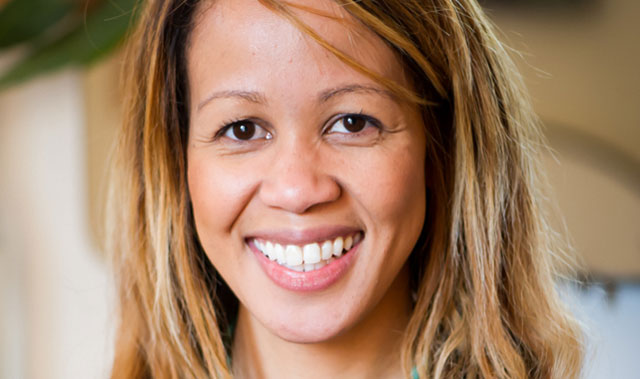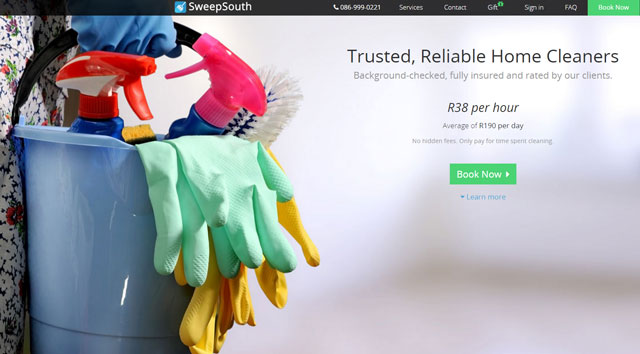
Technology-powered home cleaning services start-up SweepSouth, fresh from raising R10m in new funding, is gearing up to expand to its fourth South African city and is also contemplating its first foray outside South Africa, its co-founder, Aisha Pandor, said on Wednesday.
Pandor and her business partner (and husband) Alen Ribic quit the corporate world (Accenture and Oracle respectively) a little over two years ago to found SweepSouth, which uses the Web – and soon smartphone apps – to pair trustworthy cleaners with clients.
The platform allows users to book and pay for cleaning services online.
Already available in Cape Town, Johannesburg and Pretoria, SweepSouth now intends offering its services in Durban before the end of the year, Pandor said in an interview with TechCentral.
In January, the company said it had secured R10m in new venture capital funding from Vumela Fund as well as from existing investors – well-known technology entrepreneur Vinny Lingham and Llew Claasen’s firm, Newtown Partners.
The Vumela Fund, which was launched in 2010 to “create economic opportunities through high-impact entrepreneurship and job creation”, is capitalised by FirstRand Group and the Jobs Fund, and is managed by First National Bank in an alliance with Edge Growth. It focuses on the “scale-up phase” of a company’s development and has R388m in funds under management.
Pandor said the new funding is being used to fuel SweepSouth’s growth ambitions and to expand its team. It has hired two developers – previously Ribic had been doing all of the development work on his own – and has plans to launch Android and iPhone apps in July. The apps are important, as the bulk of traffic to the company’s website is now coming from smartphones.
It is also using the money to bulk up its support and operations teams to cope with growing demand. “We recently added our thousandth cleaner and completed 50 000 bookings on the platform.”
Of the thousand cleaners on its books, Pandor said 70% were previously unemployed and 30% underemployed, with the majority of them youngsters under the age of 34.
Cleaners are carefully vetted by SweepSouth before they can join the network, with the company accepting only about 10% of applicants. They have to have at least two years of cleaning experience, have valid citizenship or a work permit and clear a criminal background check. Once they’ve completed the interview process, they have to pass a theoretical cleaning test. They must also have a phone that supports the company’s Web app, which they use to check their schedules, get directions or communicate with clients.
“It’s an important part of the work we do. The first few cleans are closely monitored, then there’s a dual rating from both sides after every cleaning, similar to Uber,” Pandor said. “If there are any issues, we can surface those quickly.”

SweepSouth charges a flat fee of R38/hour, 80% of which goes to the cleaner. However, the company is considering dynamic pricing (similar to Uber’s surge pricing, but not as extreme) for instances where, for example, demand is particularly high in general, or demand is high for a particular cleaner.
There’s a 50-50 split between clients who use the system on an ad hoc basis and those who use it regularly. “As a recurring user, you can book a cleaner upfront for a longer period of time. You’re less likely to be able to book a specific cleaner as an ad hoc user,” Pandor said.
Though SweepSouth is not profitable, the company is being careful to not simply burn through its venture capital funding without having a plan to start making money.
“We have made a conscious decision to focus on growth as opposed to profitability, bearing in mind that we need to keep an eye on our economics to ensure we can become profitable. But we’d like to grow through at least one more round of funding.”
Pandor and Ribic will, however, remain controlling shareholders. It is deliberately raising funding in rounds, rather than upfront, to minimise dilution of their stakes.
The most immediate focus beyond launching smartphone apps and expanding the service to Durban is to consider expansion into horizontal and complementary services and to look at offshore expansion.
“Home cleaning and domestic work is such a big part of South Africa’s economy. There are very big numbers involved from both a people and a value point of view,” Pandor said. “The idea for us, though, is to understand the types of services people need in their homes and provide them.”
It also wants to expand into international markets that are similar to South Africa.
“Our model applies well in cities which have a big base of local labour but where there’s high unemployment and where people work in homes. We have had a lot of interest from Nairobi, which probably has a lot to do with the fact that it’s also considered an African tech hub. Kenya is a smaller market than South Africa. We are not against the idea of something geographically closer to South Africa, like a Botswana or a Namibia. What’s key is there has to be mobile phone adoption by both the cleaners and their clients.” — © 2016 NewsCentral Media

